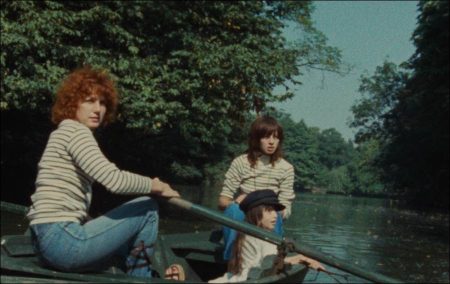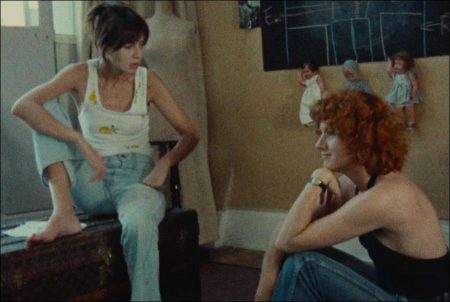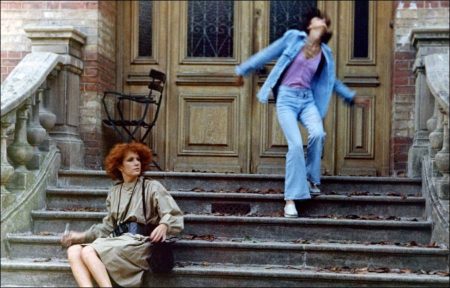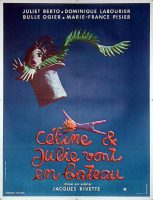Celine and Julie Go Boating begins with Julie sitting on a park bench reading a book of magic spells when a woman (Céline) walks past, and begins dropping (à la Lewis Carroll’s White Rabbit) various possessions. Julie begins picking them up, and tries to follow Céline around Paris, sometimes at a great pace (for instance, sprinting up Montmartre to keep pace with Céline’s tram).
After adventures following Céline around the Parisian streets—at one point it looks as if they have gone their separate ways, never to meet up again—Céline finally decides to move in with Julie. There are incidents of identity swapping, with Céline pretending to be Julie to meet the latter’s childhood sweetheart, for example, and Julie attempting to fill in for Céline at a cabaret audition.
The second half of the film centers around the duo’s individual visits to 7 bis, rue du Nadir-aux-Pommes, the address of a mansion in a quiet, walled off grounds in Paris. While seemingly empty and closed in the present day, the house is yet where Céline realizes she knows as the place where she works as a nanny for a family—two jealous sisters, one widower, and a sickly child.
Soon, a repetitive pattern emerges: Céline or Julie enters the house, disappears for a time, and then is suddenly ejected by unseen hands back to present day Paris later that same day. Each time either Céline or Julie is exhausted, having forgotten everything that has happened during their time in the house. However, each time upon returning via a taxi the women discover a candy mysteriously lodged in their mouth.
It seems to be important, so each makes sure to carefully save the candy. At one point, they realize that the candy is a key to the other place and time; sucking on the sweet transports them back to the house’s alternative reality (in this case a double reference to both Lewis Carroll and to Marcel Proust’s madeleine) of the day’s events.
The remainder of the film consists of the two women attempting to solve the central mystery of the house: amidst the jealous conniving of women of the house over the attentions of the widower, a young child is mysteriously murdered. But this narrative is one that repeats like a stage play, with exact phrases they soon learn well enough to start joking about.
Each time they repeat eating the candy, they remember more of the day’s events. Just as if reading a favorite novel, or again watching a beloved movie, they find that they can enter the narrative itself, with each twist and turn memorized. Far from being the passive viewers/readers that they were at first—and most movie viewers always are—the women come to realize that they can seize hold of the story, changing it as they wish.
Now, even as the plot continues to unfold in its clockwork fashion, the women begin to take control, making it “interactive” by adding alterations to their dialogues and inserting different actions into the events unreeling in the house. Finally, in a true act of authorship, they change the ending, and rescue the young girl who was originally murdered. Both realities are fully conjoined when, after their rescue of the girl from the House of Fiction, the two not only discover themselves transported back in Julie’s apartment, but this time it isn’t another “waking dream” for the young girl, Madlyn, has joined them, safely back in 1970s Paris.
Céline and Julie Go Boating (French: Céline et Julie Vont en Bateau: Phantom Ladies Over Paris) is a 1974 French metamodern film directed by Jacques Rivette. The film stars Dominique Labourier as Julie and Juliet Berto as Céline. It won the Special Prize of the Jury at the Locarno International Film Festival in 1974 and was an Official Selection at the 1974 New York Film Festival.
About the Themes
Magic is one of the themes of the film. Céline, the stage magician, does her magic tricks in a nightclub performance. Magic seems to come too from Julie’s Tarot card readings. Finally, “real” magic comes from the design of a potion, which enables both women to enter the house and take charge of the narrative.
At the start, the two women are leading relatively conventional lives, each having jobs (Julie, a librarian, is more conservative and sensible than Céline, a stage magician, with her bohemian lifestyle). As the film develops, Céline and Julie separate from the world by leaving their jobs, moving in together, and gradually becoming obsessed with the mysterious and magical events in the old house.
In one scene, according to critic Irina Janakievska, Julie is playing Tarot cards, with one of the cards interpreted as signifying that Julie’s future is behind her—exactly when we see Céline, wearing a disguise, observing Julie from one of the library desks. As Céline draws an outline of her hand in one of the books, Julie echoes that as she plays with a red ink pad.[1]
Another noticeable aspect of the film is its use of puns. For instance, the title of the film, Céline et Julie vont en bateau, has other meanings from that of taking a boat ride: “aller en bateau” also means “to get caught up in a story that someone is telling you”, or, in English, getting taken up in a “shaggy dog story”.
Celine and Julie Go Boating (1974)
Directed by: Jacques Rivette
Starring: Dominique Labourier, Juliet Berto, Marie-France Pisier, Bulle Ogier, Barbet Schroeder, Nathalie Asnar, Marie-Thérèse Saussure, Philippe Clévenot, Anne Zamire, Adèle Taffetas
Screenplay by: Jacques Rivette, Dominique Labourier, Juliet Berto, Eduardo de Gregorio, Bulle Ogier, Marie-France Pisier,
Cinematography by: Jacques Renard
Film Editing by: Nicole Lubtchansky
Costume Design by: Jean-Luc Berne, Pierre D’Alby, Laurent Vicci
Makeup Department: Ronaldo Abreu
Music by: Jean-Marie Senia
MPAA Rating: None.
Distributed by: Films du Losange
Release Date: September 1974 (France), October 7, 1974 (New York Film Festival)
Visits: 207



